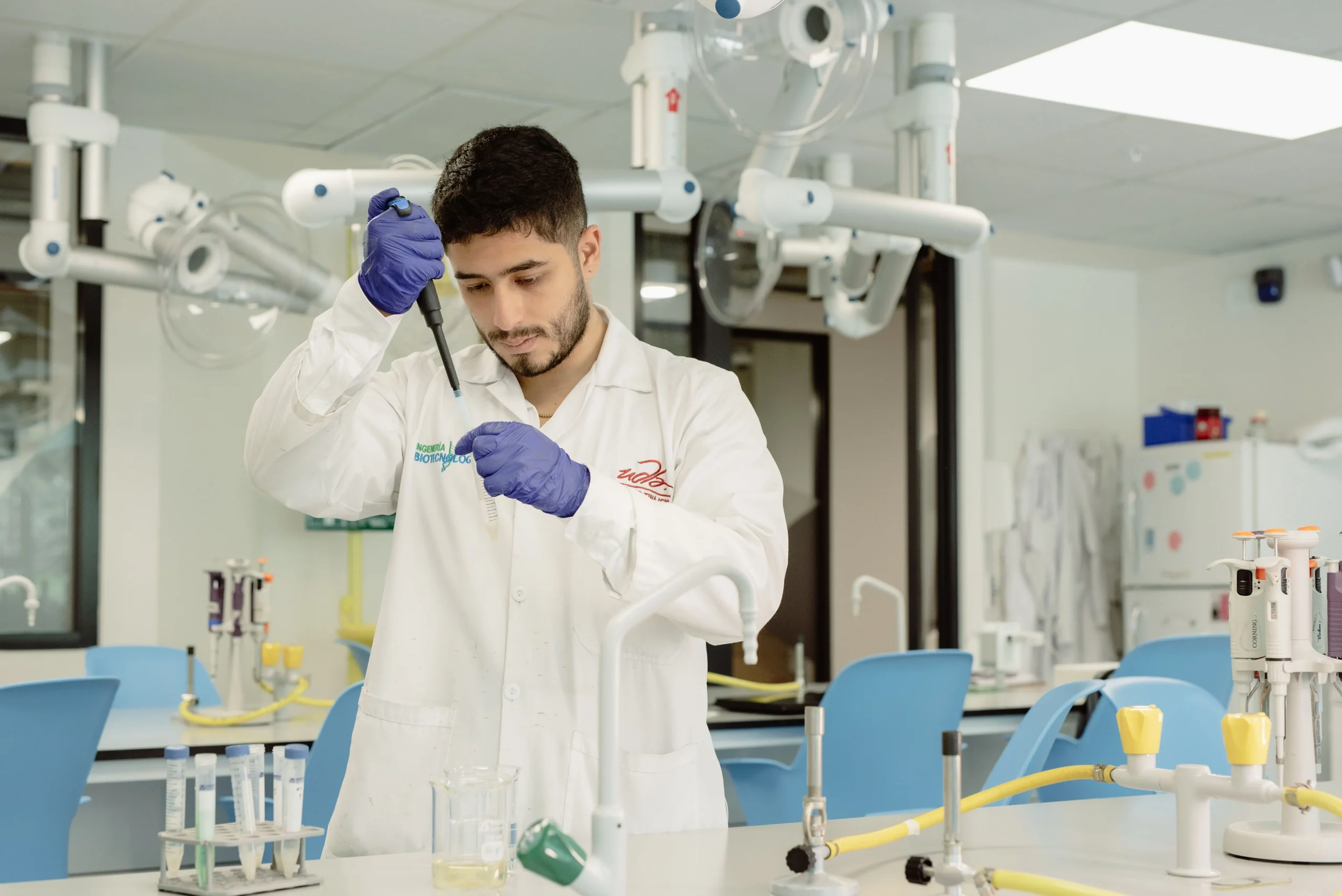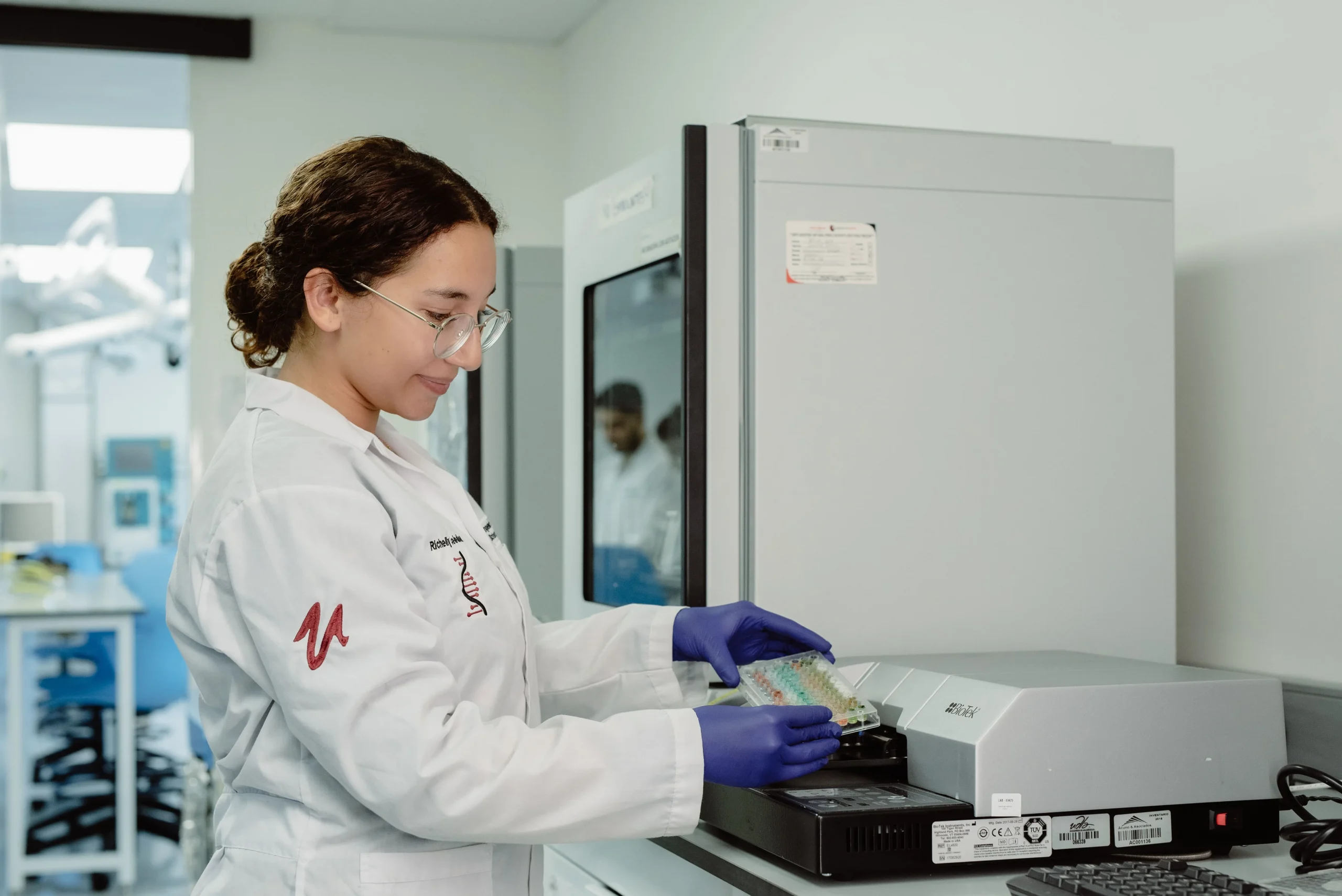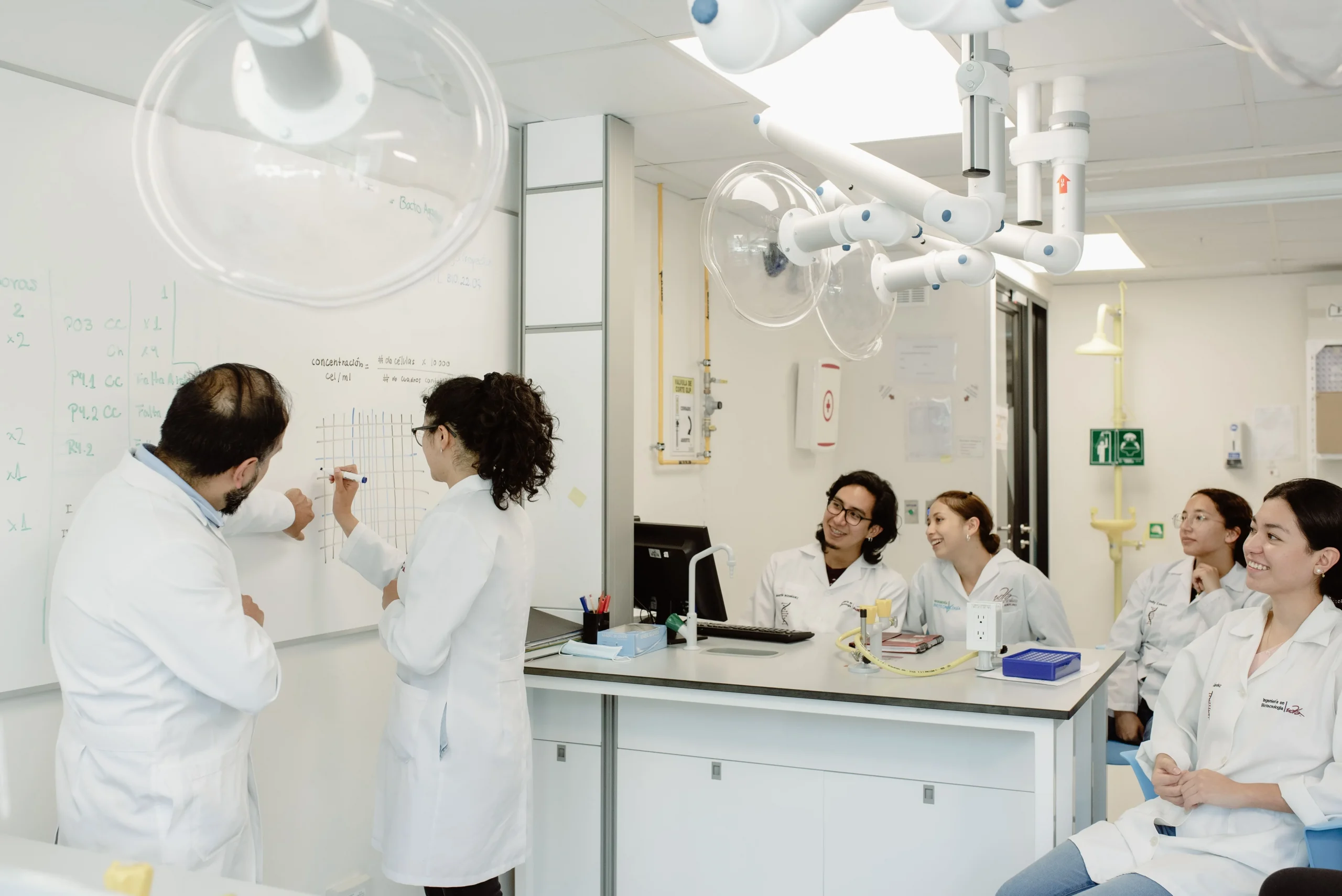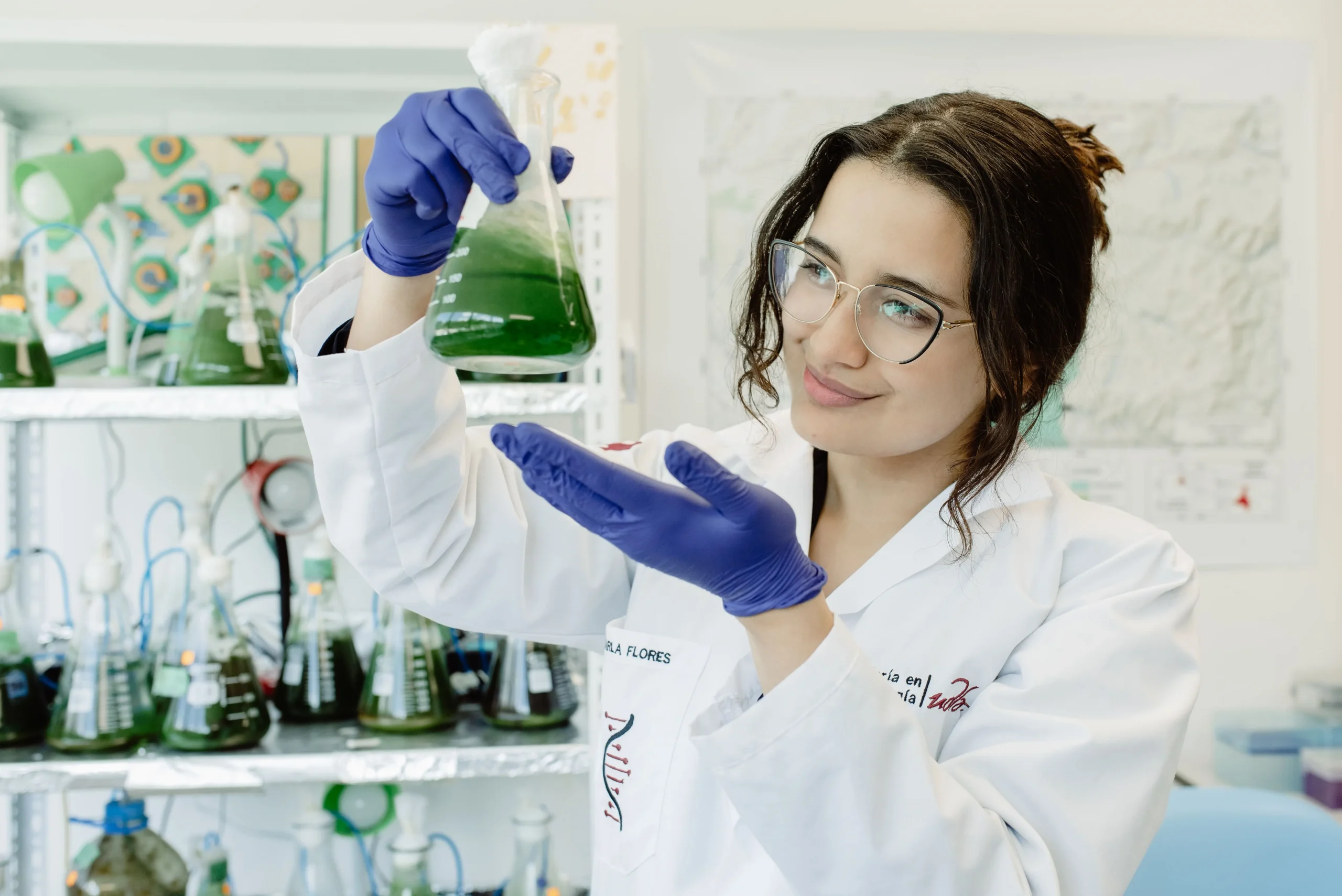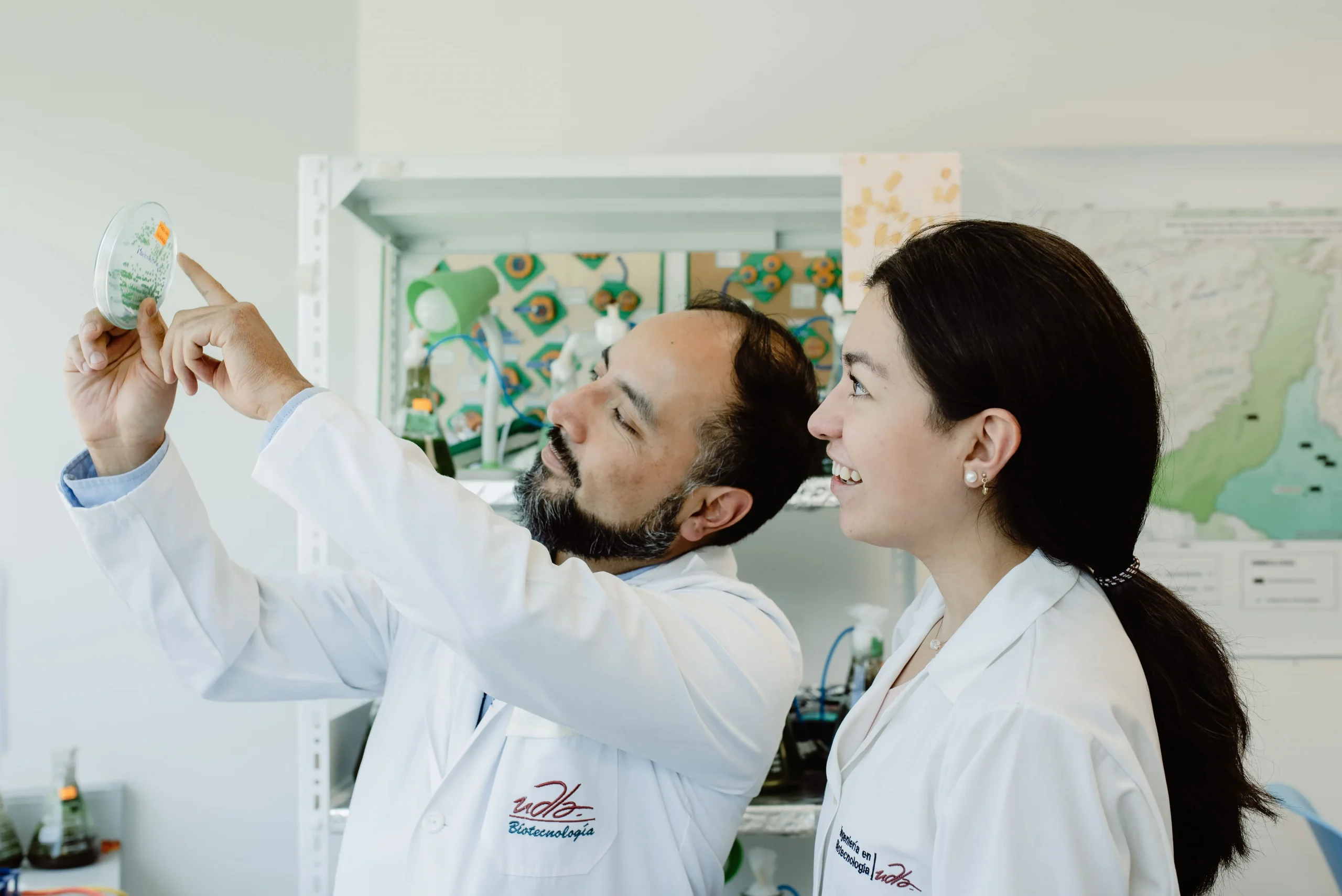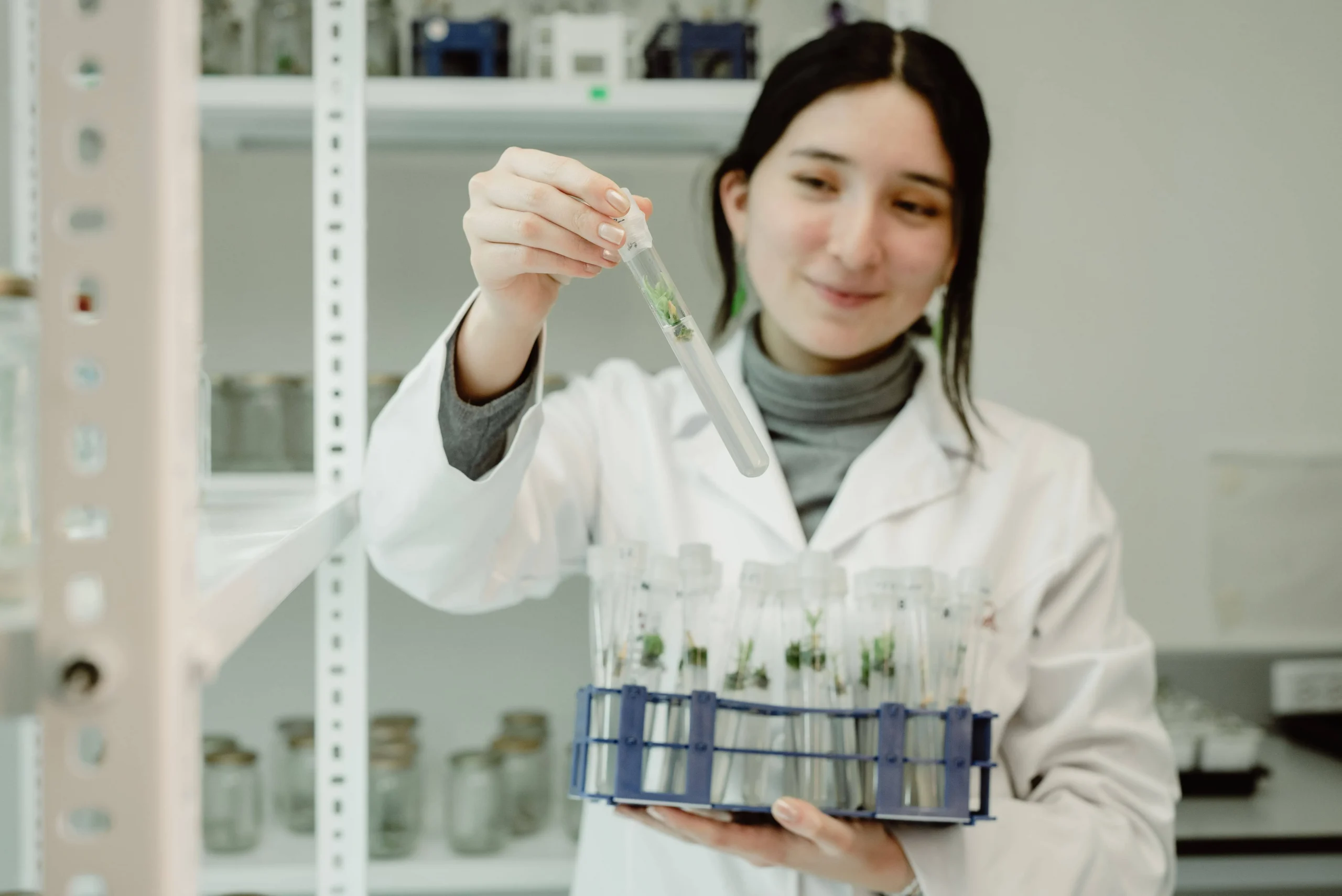Title : Bachelor in Biotechnology Engineering
Duration: 9 semesters
Modality: On site
** The curriculum may be subject to changes.
Biotechnology Engineering program is aimed at people with curious minds who are passionate about research and enjoy exploring and learning about the processes that occur in living beings. Applicants to the program should be well-organized, with analytical skills, a passion for biology and chemistry, and the ability to work in teams in a variety of scenarios. This program trains professionals who will use biotechnology in the fields of engineering and research to address the issues facing modern society. This is in the realms of biomedical sciences, the improvement of plant and animal species, the production of industrial enzymes, biofuels, and environmental improvement. A career in this field contributes to the creation of products, processes, and services that promote biodiversity and the sustainable use of natural resources.
- UDLA’s educational model is based on practice, which allows students to shine in the professional world.
- Full-time faculty with masters and doctorate degrees who are focused on the scientific and technical development of the student.
- Part-time faculty immersed in the latest developments in the biotechnology industry.
- Students will develop competencies to help them think critically, innovatively, and creatively.
- Students will receive professional training with the necessary skills to formulate, evaluate, and manage biotechnology projects.
- Classrooms and laboratories are equipped with cutting-edge technology and equipment.
- Students participate in observation tours, field trips, and technical visits to various organizations.
- The program has established agreements with national and foreign institutions for internships and graduate work.
- Possibility of studying abroad, access to internships, and graduate studies.
A biotechnology engineer will:
- Research biological processes and living organisms through the application of scientific methods.
- Apply biotechnological tools and viable entrepreneurial proposals to develop useful products and procedures for mankind.
- Design bioprocesses to obtain biotechnological products that contribute to sustainable development.
- Master laboratory techniques for research and analysis.
- Effectively communicate and present scientific data and information.
- Apply bioinformatics tools of data analysis and visualization to explore scientific databases.
Upon graduation, students can work in any sector where biotechnology is applied such as:
- Pharmaceutical Industry
- Institutions dedicated to food and agro-industrial development.
- Public and private institutions dedicated to environmental conservation.
- Scientific research at universities.
- Planning and development agencies.
- Biotechnology consulting.
Biotechnology Engineers from Universidad de Las Américas are competent, enterprising professionals with an international-global vision, capable of developing basic and applied research, designing and executing biotechnological processes, performing laboratory analysis, and managing projects using technologies based on modern biology.
Graduates will be equipped with the necessary skills to identify, formulate, and solve complex engineering problems through the application of scientific and mathematical principles. They will employ engineering design in biotechnology to create solutions that address specific needs while considering variables related to the areas of public health, safety, and welfare, as well as global, cultural, social, environmental, and economic factors. In professional settings, they will be able to communicate effectively with a wide range of audiences relevant to the discipline. In addition, they will have the ability to recognize ethical and professional responsibilities in engineering situations and make well-informed judgments, considering the impact of engineering solutions in global, economic, environmental, and social contexts. Graduates will have the capacity to work effectively in teams whose members, together, exercise leadership, foster a collaborative and inclusive environment, meet goals and plan tasks. Moreover, they will develop and carry out experiments, analyze and interpret data, and use engineering judgment to draw conclusions. Finally, they will learn to employ the right learning strategies to acquire and apply new knowledge as needed.
The Biotechnology Engineer from UDLA is expected to lead diverse multidisciplinary work teams in national and international contexts and to conduct themselves with academic-scientific rigor, in an ethical, honest, and responsible manner, always respecting all legal frameworks, while being committed to the country’s biotechnology development process for the benefit of society.
- Implement biotechnology solutions for companies and institutions involved in research or industry.
- Demonstrate competence, effective participation, and ability to lead and coordinate multidisciplinary teams managing projects in the field of biotechnology.
- Strengthen integral skills and lifelong technological adaptability through ongoing training and updating.
- Add value to organizations by exercising the profession with values and ethical principles.
A graduate of the Biotechnology Engineering program will be able to:
- Identify, formulate, and solve complex engineering problems by applying principles of engineering, science, and mathematics.
- Apply engineering design to produce solutions that meet specific needs with consideration of public health, safety, and welfare, as well as global, cultural, social, environmental, and economic factors.
- Communicate effectively with a range of audiences within the field.
- Recognize ethical and professional responsibilities in engineering situations and make informed judgments, which must consider the impact of engineering solutions in global, economic, environmental, and societal contexts.
- Work effectively in a team whose members, together, exercise leadership, create a collaborative and inclusive environment, set goals, plan tasks, and accomplish objectives.
- Develop and conduct appropriate experimentation, analyze, and interpret data, and use engineering judgment to draw conclusions.
- Acquire and apply new knowledge as needed, using appropriate learning strategies.
This committee addresses issues related to the fulfillment of educational objectives, degree profile, and other academic aspects linked to the program’s development.
Responsibilities:
- Review the program’s educational objectives, degree profile, student learning outcomes, and plan of study.
- Propose changes or recommendations to the program’s educational objectives, degree profile, student learning outcomes, and plan of study.
Participants:
Title | Name |
Dean of the College of Engineering and Applied Sciences | Diego Buenaño |
Program Director | Emilia Vásquez |
Professor responsible for monitoring alumni | Fernando Rivas |
Curriculum Professor | Wilson Tapia |
Employers’ representatives and/or representatives of professional associations or guilds | Rommel Granja |
Alberto Roura | |
Daniela Arcos | |
Alumni | Estefanía Almeida (President) |
Diego Valdospinos | |
Carolina Cabrera |
Bachelor
| Academic Year | 2018 | 2019 | 2020 | 2021 | 2022 |
| Number of Students | 340 | 340 | 330 | 297 | 275 |
Bachelor Degrees Awarded
| Academic Year | 2018 | 2019 | 2020 | 2021 | 2022 |
| Number of Students | 57 | 48 | 33 | 83 | 75 |
If you are enrolled in another university, you can have your courses recognized through our simulator and study at UDLA.
Apply here
